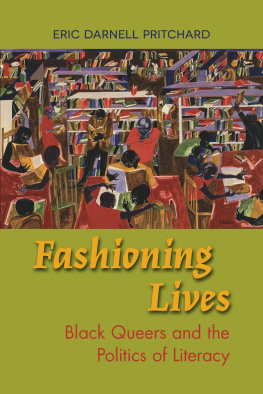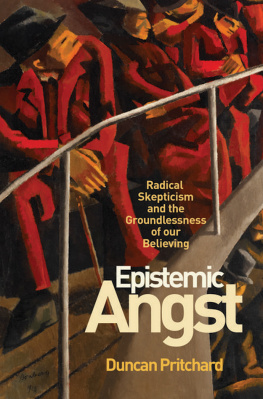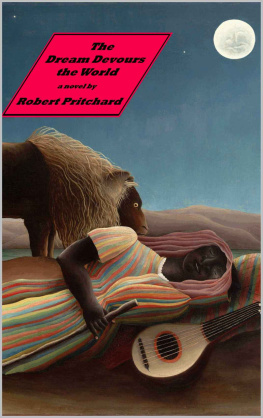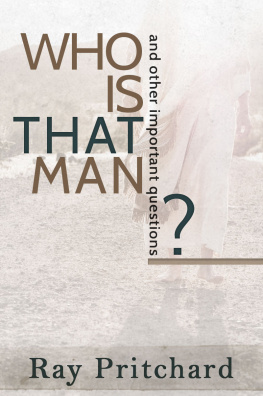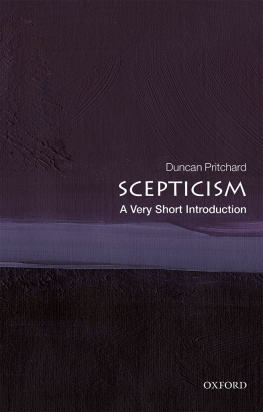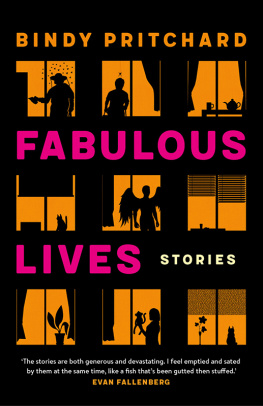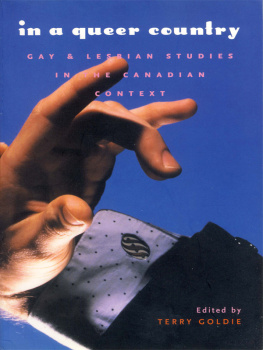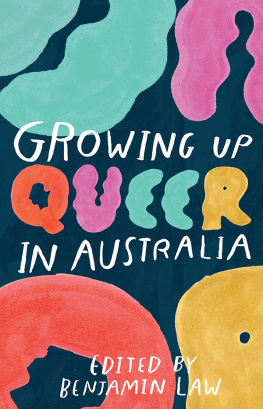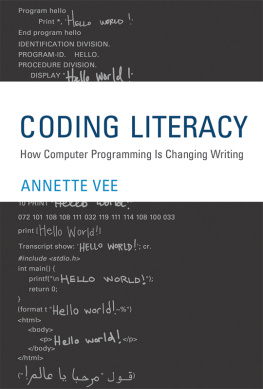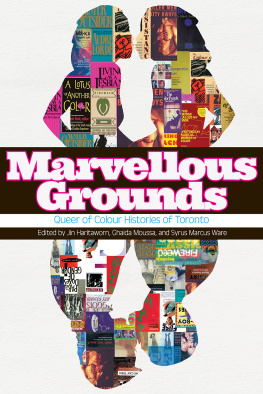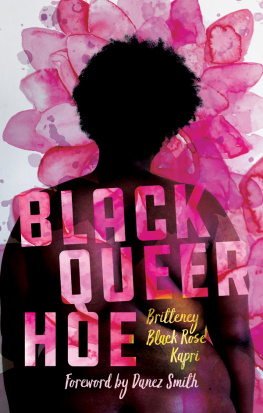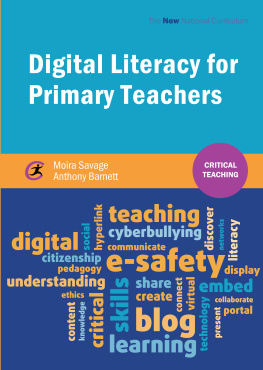A portion of was previously published as Like Signposts on the Road: The Function of Literacy in Constructing Black Queer Ancestors, Literacy in Composition Studies 2, no. 1 (2014): 2953.
Names: Pritchard, Eric Darnell author.
Title: Fashioning lives : black queers and the politics of literacy / Eric Darnell Pritchard.
Description: Carbondale : Southern Illinois University Press, 2017. | Includes bibliographical references and index.
Identifiers: LCCN 2016018365 | ISBN 9780809335541 (pbk. : alk. paper) | ISBN 9780809335558 (e-book)
Subjects: LCSH: LiteracySocial aspectsUnited States. | African-American sexual minoritiesSocial conditions. | African American sexual minoritiesInterviews.
Classification: LCC LC151 .P75 2017 | DDC 302.2/2440973dc23 LC record available at https://lccn.loc.gov/2016018365
Acknowledgments
Maya Angelou has said, Thank you, always say thank you; its the greatest gift you can give someone; because thank you is what you say to God: . In this wisdom, I say thank you to God, to all of Gods manifestations in the Orisha, Saints, to all of my ancestor helping spirits, and to all of my guardian angels for the blessing of life and the vision, fortitude, love, joy, creativity, and care they provided me in bringing this book to life. I am grateful.
My thanks to the institutions that have offered financial support and intellectual community to me toward the completion of this project: a Scholar-in-Residence Program Fellowship sponsored by the National Endowment for the Humanities at the Schomburg Center for Research in Black Culture; a Visiting Scholar Fellowship from the James Weldon Johnson Institute for the Study of Race and Difference at Emory University, which supported this project and my next; two summer research grants from the University of Texas at Austin John L. Warfield Center for African American Studies; special research grants from the Office of the Vice President for Research at the University of Texas at Austin.
I am indebted to several community and national organizationsZami Incorporated in Atlanta, the Unity Fellowship Church in Baltimore, and Fire & Inkthat helped me to spread the word about my research, which helped me to attract research participants for interviews across the country. My gratitude also to Priscilla Hale and Rose Pulliam of Allgo in Austin, Alexis Pauline Gumbs of Eternal Summer of the Black Feminist Mind in Durham, Ruth Nicole Brown and SOLHOT (Saving Our Lives, Hear Our Truths), Kerry Ann Rockquemore and the National Center for Faculty Development and Diversity (NCFDC) along with Kathryn Gines and the NCFDC writing group I participated in, St. James Episcopal Church in Austin, The Riverside Church in New York, and the Tabernacle Baptist Church in Atlanta, who have provided the love, community, space, and encouragement that kept me well, grounded, clear, and committed while writing this book.
My terrific research assistants deserve so much praise. Porsh Renee Garner masterfully helped organize the final bibliographic information I had amassed over the years of working on this project. Maya Berry, my research assistant at the Schomburg Center, helped me retrieve and organize hundreds of pages of archival documents and other research materials. Their skillful assistance came at key times in my work, and I am thankful.
I thank all of the archivists and librarians who have assisted me in locating resources to write this book. Diana Lachatanere, Steven Fullwood, and the entire staff of the Schomburg archive and library were so helpful in locating materials I needed. I am especially thankful to Steven Fullwood for his important work curating the In the Life Archive (formerly Black Gay and Lesbian Archive) at the Schomburg. It has been a gem of a resource for all of my projects and for others doing work on Black LGBTQ life, history, culture, and politics. My thanks to the late Taronda Spencer, former head archivist at Spelman College, and her colleague Kassandra Ware, as well as the staff of the Emory University Manuscript and Rare Books Library. In addition, Id like to thank the trailblazing elders Barbara Smith, Jewelle Gomez, Louis Hughes, A. Billy Jones, and Gil Gerald for the valuable insights they shared with me about Black LGBTQ cultural production and activism that proved to be very helpful in reconstructing important details of the social history of Black LGBTQ literacy and rhetoric.
This book is far better for the feedback of those who read early drafts. Two anonymous reviewers from Southern Illinois University Press, Gwendolyn D. Pough, Deborah L. Brandt, Craig Werner, and David Glisch-Sanchez each read the entire manuscript in draft form, and I am thankful for their thoughtful comments. Beverly J. Moss, Meta DuEwa Jones, Cherise Smith, Tamika L. Carey, Roderick Ferguson, LaToya L. Sawyer, and Badia Ahad each read a portion of the book in draft form. I am also thankful to them for their astute observations and for taking time from their own work to support mine. Colin Palmer, past director of the Schomburg Scholar-in-Residence Program, assistant program director Venus Green, and my Schomburg fellows cohortSherie M. Randolph, Robyn Spencer, Sandra Duvivier, M. Thomas J. Desch-Obi, and Myisha Priest, as well as continuing Schomburg fellows Carolyn Brown, Carter Mathes, and Laurie Woodardprovided thoughtful feedback on an early version of chapters of this book.
I am so grateful for the editorial and production staff of SIU Press, including Wayne Larsen, Linda Buhman, Ryan Masteller, and Lynanne Page. I am especially thankful for my editor Karl Kageff. Karls enthusiasm, patience, and support have made the publication of my first book a pure pleasure.
I have been blessed with wonderful mentors and colleagues that supported my work and me from the start. Among them, the late Nellie Y. McKay, Deborah Brandt, and Craig Werner have always been a triumvirate model of scholarly rigor, pedagogical brilliance, and generosity. Nellie McKay will forever be a paragon of scholarly excellence, and her mentorship is legend among scholars that span generations. I am grateful to have known her, been taught by her, and been one of the students who benefited from the once-in-a-lifetime community she and her colleagues created at the University of Wisconsin-Madison. Deborah Brandt is more than a literacy scholar nonpareil. Her wisdom, goodness, and courage have been an astonishing example. My work and, indeed, my life are better for that example as well as her generatively challenging questions, keen insights, deep encouragement, and reminder to be about it. Craig Werner is both a superlative scholar and work of art in the classroom, and I am grateful for every single conversation weve had about this book, for his feedback on early drafts, for his uncanny ability to bring writers back to the heart of the matter in their work, and for the Aretha Franklin Tapestry in Black mixtape he made and shared with me that accompanied me through many late nights and early mornings writing. Each of them are more than colleagues, they are family.

